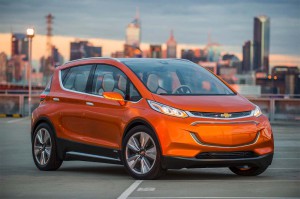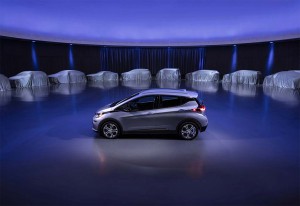
General Motors Chairman and CEO Mary Barra talked about the company's future batter-electric vehicles at CityLab Detroit 2018.
General Motors has proposed downshifting the federal fuel-economy standards it signed off when it went bankrupt a decade ago, but its top executive said she hopes the automaker can help hasten the switch to electric vehicles.
GM said in a document released this week it favors annual increase in fuel-efficiency standards based on “historic rates” rather than the Obama era rules or a proposal from Trump administration proposal that would basically loosen the current standards.
Mary Barra, GM chairman and chief executive officer, noted in remarks in Detroit that GM has taken a leading role in the development of electric vehicles and is now developing its fourth generation of EVs. “We have a very aggressive rollout of electric vehicles between now and 2023,” Barra told the City Lab Detroit Conference which was arranged by The Atlantic magazine, Bloomberg Philanthropies and The Aspen Institute to discuss urban issues such the future of transportation.
(GM setting course for its own emissions standards. Click Here for the story.)

Barra told the CityLab crowd that range anxiety is no longer a problem for EVs with vehicles like the Chevy Bolt going 238 miles on a charge.
“If we can work together, we can put a very significant number of vehicles on the road,” said Barra, who said one of the keys to wider use of electric vehicles is the expansion of the charging network.
“We don’t have range anxiety anymore,” noted Barra, who said the Chevrolet Bolt can travel 238 miles on a single charge.
“What we have now is charging anxiety,” who told the audience, which was made up of officials from around the United States, who deal urban problems. Last week, GM filed its comments with the U.S. Environmental Protection Agency indicating that the number of electric vehicles on the road in the U.S could grow quickly in the next decade.
Establishing ZEV requirements (by credits) each year, starting at 7% in 2021 and increasing 2% each year to 15% by 2025, then 25% by 2030, GM said in its EPA filing.
Barra also stressed that General Motors believes climate change to be a serious environmental challenge and has to be addressed. In the past, many executives in the auto industry had tended to minimize danger posed by climate change and had argued that electric vehicles were impractical.
“Everyone in GM’s senior management believes climate change is real,” Barra said. “A dozen years ago, we had people who didn’t believe climate change was real. That’s not the case now.”
(Click Here for more about GM getting kudos for renewable energy commitments.)
Barra also said autonomous vehicles, which GM expects to have on the road on a limited basis, can help re-shape the urban environment in the future. Currently there are three parking spaces for every car on the road in the U.S. which has enormous implications for land use in big cities, she noted.
“The technical challenges involved in developing autonomous vehicle are enormous, but GM is confident that it can move along to the point where users will feel comfortable traveling in a vehicle without a driver or even a steering wheel. I see this as an opportunity,” he said.
Asked why GM’s market capitalization is a fraction of Tesla’s, Barra said that it comes down to the fact that GM is 100-year old company. In addition, GM’s bankruptcy a decade also has made investors skeptical.
Barra said she wants GM thought of as a technology company and stressed the importance of electric vehicles, saying that “We need to tell more of what innovation we’re doing, and how aggressively we’re pursuing electric vehicles and our commitment to the environment.”
GM is a much different company than it was a very different company than it was a decade, she said. The move into autonomous vehicle and electric vehicles could help prove the company’s underlying value, she said.
(To see more about GM expanding its electric vehicle team, Click Here.)
“The hardest technological challenge we’ll face this decade, and maybe in our lifetimes,” she said, adding, “But being able to do that has such a promise of an improved world, it’s worth investing and working on. So once we establish that, and again we’re on a path to do that next year, then it just becomes how fast you can roll that out, how the regulatory environment allows you to do that,” Barra said.


I challenge any American to drive a electric car and then want to go back to an ice car again and it’s for the benefit of our country United States and the world
I challenge any US citizen to drive and Evie and then decide if they want to go back to a gas car it’s night and day in the best for the world
I know I will never come back and I live in Illinois I’m from California but electric cars drive a hundred times better